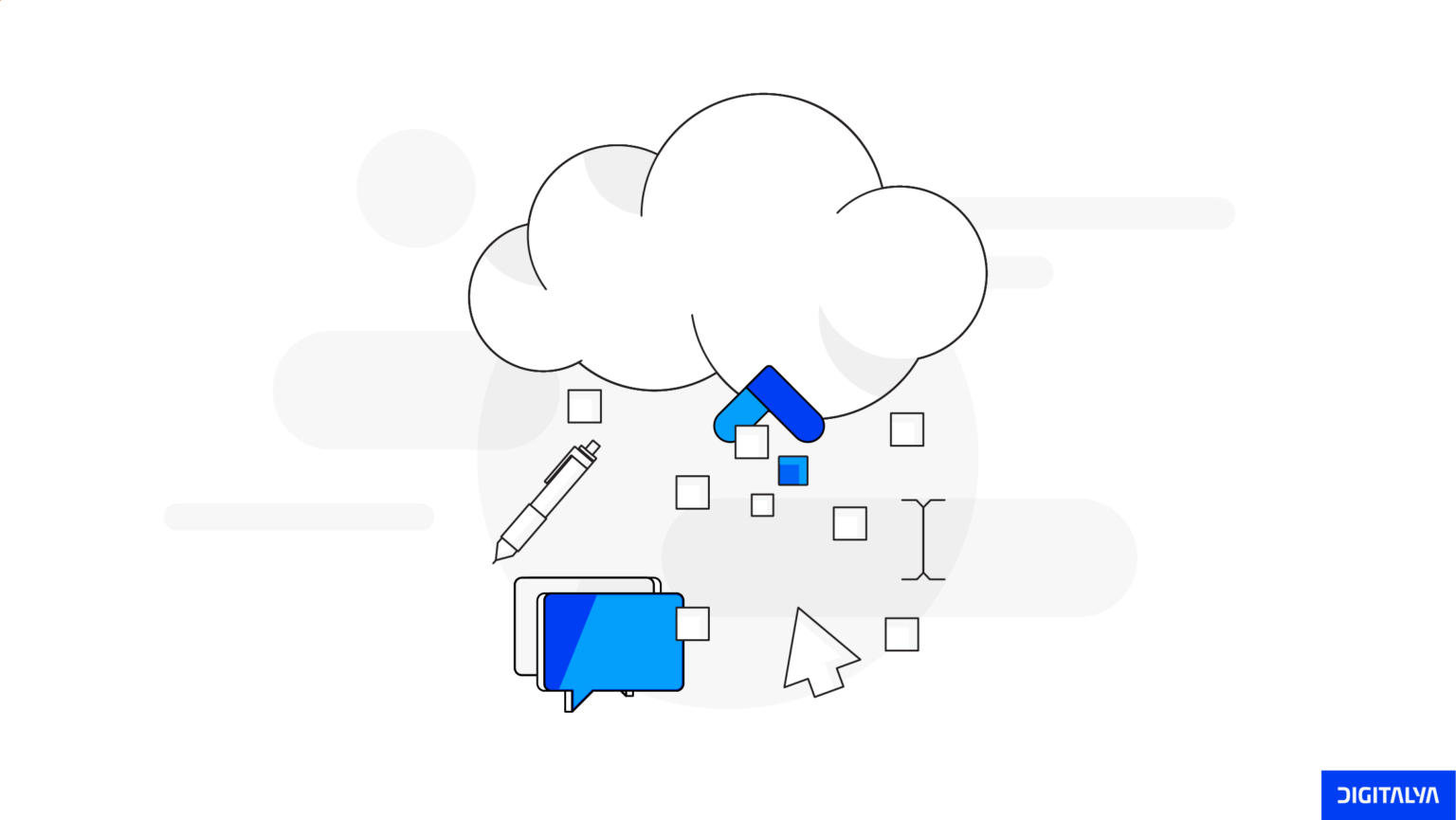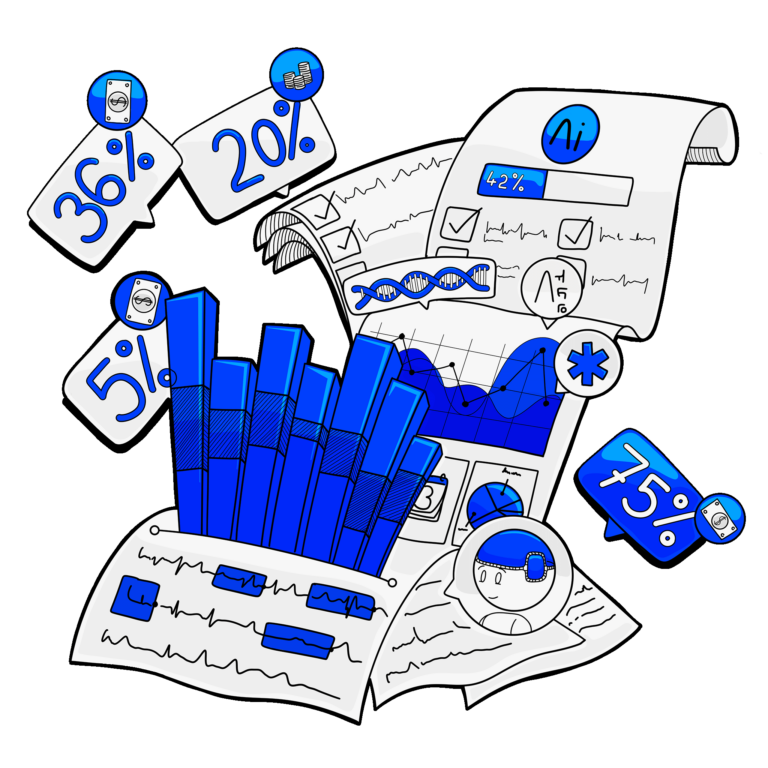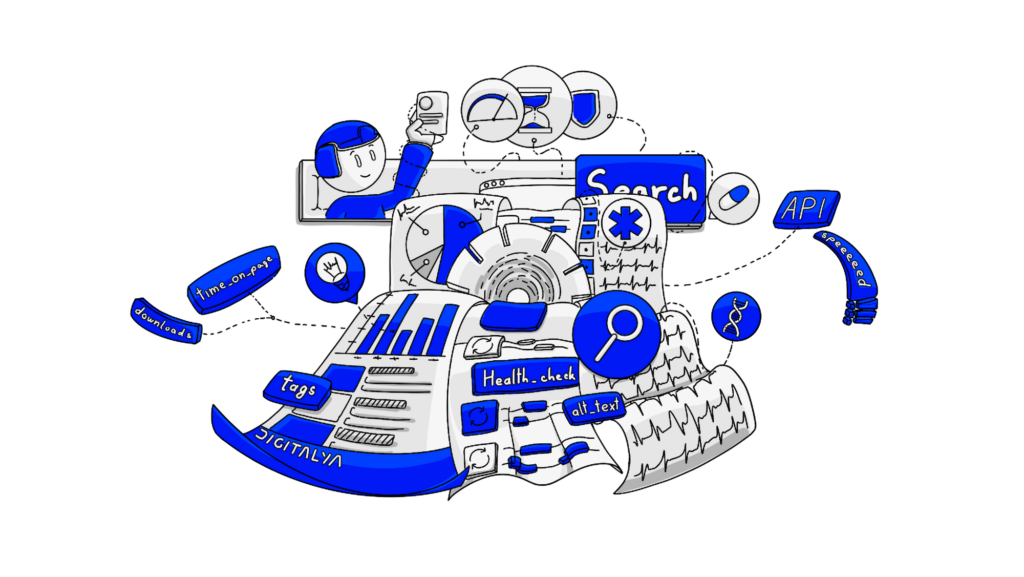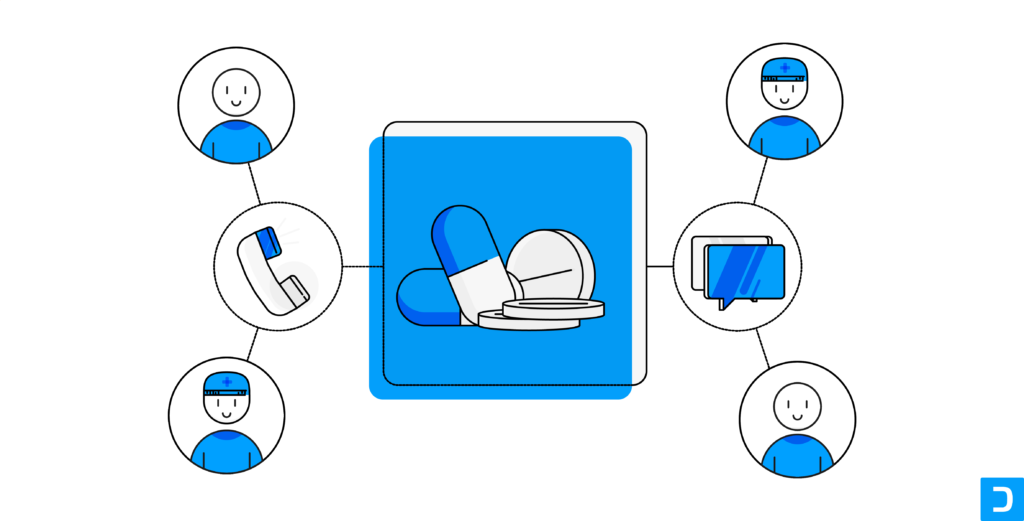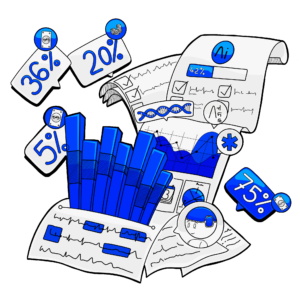In the dynamic landscape of health care and pharmaceuticals, the winds of change are sweeping across the industry, promising a profound digital transformation.
Technology is at the heart of this evolution, bringing with it a wave of innovation that has the potential to revolutionize the way pharma companies conduct research, develop treatments, and interact with patients and HCPs.
In this article, we’ll explore the key technologies that drive this digital transformation in pharma and their impact on the entire ecosystem.
1. The digital transformation in pharma
Digital transformation in the pharmaceutical industry has become a strategic imperative, reshaping how pharma companies operate. Emerging technologies like AI and machine learning, big data, cloud computing, IoT, and blockchain are revolutionizing drug discovery, development, manufacturing, and delivery.
As the pharma industry shifts toward digital maturity with more efficient, patient-centric, and data-driven models, digital transformation addresses critical needs: personalized healthcare, complex data management, and streamlined regulatory compliance. In today’s landscape, it’s no longer optional—it’s essential. This shift necessitates that companies adapt their business models to fully integrate digital technologies, moving from product-oriented to digital-centric offerings.
From a business point of view, digital health is at the top of most executives’ agendas in the life sciences industry. According to healthcare research by Accenture, 92% of health executives they interviewed considered it a top strategic priority to deliver highly personalized experiences.
Companies adopting digital transformation strategies stand to gain significant benefits, including improved scalability and enhanced value from their AI investments. A McKinsey study found that in 2022, big tech players invested $10 billion in deals related to tech healthcare.
Here are some specific examples of how digital tools are being used to shape the digital revolution in the pharma industry:
- Pfizer uses AI to develop new drugs and improve its clinical trial processes.
- GlaxoSmithKline is using big data analytics to identify new drug targets and to personalize patient care.
- Novartis is using cloud computing to support its manufacturing operations and to develop new digital applications.
- Roche is using the IoT to connect and monitor its manufacturing equipment and to develop new digital health applications.
- Sanofi is using blockchain to track the movement of drugs through its supply chain and develop new digital health applications.
1.1 Defining digital transformation in pharma
The digital revolution in life sciences requires digital technologies that improve the quality, efficiency, and accessibility of healthcare services. It’s transforming every aspect of healthcare, from how diseases are diagnosed and treated to how patients are engaged and empowered.
This has several positive impacts, including:
- Improved quality of care – clinicians can access real-time data and insights, enabling them to develop personalized treatment plans.
- Reduced costs – costs can be reduced by automating tasks, improving efficiency, and reducing waste.
- Increased accessibility – digital technologies make healthcare more accessible to patients, especially those who live in rural or underserved areas.
- Empowered patients – patients have more control over their healthcare and are provided with access to information and resources.
However, the digital transformation also presents some challenges, including:
- Data security and privacy – digital technologies generate vast amounts of data, which must be protected from unauthorized access and use.
- Equity and access – digital technologies can aggravate existing inequalities in healthcare access and outcomes.
- Ethical considerations – the use of digital technologies raises a number of ethical considerations, such as the use of AI in decision-making and the use of data to monitor and track populations.
Overall, this focus on digital tools is a positive development with the potential to improve the quality, efficiency, and accessibility of healthcare services for all. However, awareness of this transformation’s challenges and ethical considerations is essential.
1.2 Drivers of change in the pharmaceutical sector
We can broadly categorize drivers of change into two main groups:
| External factors | Internal factors |
|---|---|
| Patient expectations – patients increasingly demand more personalized and convenient healthcare services. | Cost reduction – pharma companies are under increasing pressure to reduce costs. |
| Regulatory requirements – governments worldwide increasingly require the pharmaceutical industry to adopt digital technologies. | Innovation – pharma companies must constantly innovate to keep up with the latest scientific advances and develop new drugs and treatments. |
| Competition and market dynamics – the ability to adapt to changing market dynamics is crucial as pharma companies face increasing competition from traditional and new market entrants. | Patient engagement – the importance of engaging with patients is increasingly recognized. |
1.3 Digital maturity in pharma
Digital maturity in the pharmaceutical industry refers to how pharmaceutical companies have adopted and integrated digital technologies into their operations. Achieving digital maturity is crucial for pharmaceutical companies to remain competitive and improve patient outcomes.
Digital maturity involves leveraging digital tools such as data analytics, artificial intelligence, and machine learning to enhance operational efficiency, drive innovation, and improve product quality.
Pharmaceutical companies with high digital maturity are better equipped to utilize digital solutions like remote patient monitoring and electronic batch records. These tools improve patient safety and reduce costs by streamlining processes and minimizing errors.
For instance, remote patient monitoring allows for continuous patient health tracking, leading to timely interventions and better management of chronic conditions.
Similarly, electronic batch records ensure data integrity and compliance in manufacturing processes, reducing the risk of human error and enhancing quality assurance.
In essence, digital maturity enables pharmaceutical companies to harness the full potential of digital technologies, leading to improved patient outcomes, operational efficiency, and sustained revenue growth.
2. Custom software development in pharma
Custom software development plays a crucial role in the digital transformation in the pharmaceutical industry since it empowers pharma companies to leverage digital technology to create tailored, efficient, and compliant digital solutions to address their specific needs.
Tailored digital tools can address various challenges and opportunities, including:
- Drug development and discovery – custom software can automate tasks, improve efficiency, and accelerate the drug discovery and development process. (e.g., screening drug candidates, identifying new drug targets, designing a clinical trial, etc).
- Manufacturing – custom digital solutions can be used to improve manufacturing operations’ efficiency and quality control. (e.g., automation of production processes, monitoring equipment, tracking inventory, etc.)
- Sales and marketing – tailored software can improve the effectiveness of sales and marketing campaigns. (e.g., targeting customers with relevant messages, tracking customer behavior, managing sales pipelines, increasing HCP engagement, etc.)
- Patient care – custom software can improve the quality and efficiency of patient care. (e.g., developing electronic health records, providing telemedicine services, managing patient education programs, etc.)
Custom software development can also be used to support new digital business models in pharma. For example, pharmaceutical businesses can use custom software to develop new patient support programs, launch digital health applications, and offer direct-to-consumer services, all of which contribute to a higher competitive advantage.
2.1 Addressing pharma-specific needs
Custom software development plays a crucial role in the digital transformation in pharma, as it empowers pharma companies to create tailored, efficient, and compliant digital solutions to address their specific business objectives and drive revenue growth.
- Streamlined workflows – pharmaceutical firms can design and implement digital systems that streamline complex processes across varied departments, from research and development to manufacturing, supply chain, and commercial operations. Development and manufacturing organizations leverage these systems to manage data, automate repetitive tasks, and ensure a seamless flow of information between teams, which can significantly enhance efficiency and productivity.
- Data Management and Analysis – the pharmaceutical industry generates massive amounts of historical data, from clinical trial data, patient records, and research findings to supply chain information and HCP interactions. Tailored digital platforms can be designed to efficiently capture, store, and analyze this data, allowing companies to extract meaningful insights, optimize decision-making, and support data-driven drug development.
- Compliance and regulatory requirements – the pharmaceutical industry is highly regulated, with stringent data security and compliance standards. Custom software can be designed to meet these specific regulatory requirements, ensuring data integrity, security, and traceability.
- Patient-centric solutions – pharma companies develop patient-focused digital tools like mobile health apps and patient portals. These digital solutions enable remote monitoring, provide patient education, and enhance medication adherence. This improves patient outcomes and builds brand loyalty.
- Data integration and interoperability – pharma companies often work with various datasets from multiple sources, including electronic health records, research studies, and commercial data. Achieving digital transformation requires creating custom digital solutions that facilitate seamless data integration and interoperability. This ensures that different systems can communicate and share data efficiently, leading to more comprehensive analyses and insights.
- Integration with existing systems – legacy systems are often in place for most pharma companies. The constant process of creating interfaces and connectors that seamlessly integrate new digital solutions with existing infrastructure ensures a smooth transition to a more digitized environment and higher operational efficiency.
3. Data analytics and artificial intelligence
Data analytics and artificial intelligence are integral components of the digital transformation in pharma and the whole life sciences industry, revolutionizing various aspects of drug discovery, development, and healthcare delivery. Let’s dig deeper into their roles and impact:
3.1 Drug development and discovery
The pharmaceutical sector generates immense amounts of data during drug discovery. Analytics tools can analyze information to more efficiently identify potential drug candidates. Predictive analytics help select the most promising compounds, optimize experimental designs, and accelerate the preclinical phases of drug development.
Machine learning algorithms can analyze complex datasets, identify patterns, and predict the potential success of drug candidates while also helping with quality assurance. AI models can learn from previous research outcomes, leading to more informed decision-making in the drug development pipeline. This accelerates the identification of viable drug candidates and reduces the time and cost associated with development.
3.2 Clinical trial optimization
Analyzing clinical trial data is a complex process. Data analytics allows for extracting meaningful insights from patients data, facilitating the identification of trends, patient subgroups, and potential challenges. This can optimize trial design, recruitment strategies, and overall trial efficiency.
Having properly trained staff is crucial to ensure quality and consistency in clinical trials. Properly trained personnel can rigorously adhere to standardized procedures, maintaining the integrity of the trial data and outcomes.
Only then you can add machine learning operations to predict patient recruitment rates, identify suitable trial sites, and analyze real-time data during trials. This enhances patient satisfaction, ensuring that the right trial participants are selected. AI-powered predictive modeling also helps monitor patient safety and identify adverse events early.
3.3 Real-world evidence generation
Real-world evidence (RWE) is vital for understanding the performance of a drug in diverse patient populations and real-world settings. These tools can analyze electronic health records, claims data, and other resources to generate valuable insights into the effectiveness of a drug, safety, and long-term outcomes.
Artificial intelligence can enhance real-world data analysis by identifying relevant patterns and correlations. Natural language processing (NLP) algorithms can extract data from unstructured clinical notes, improving the completeness and accuracy of RWE analyses. AI-driven RWE contributes to post-market surveillance and informs regulatory decision-making for improved business outcomes.
3.4 Personalized medicine
Pharmaceutical companies can analyze patient-specific information, including genetic data, clinical history, and lifestyle factors, to identify personalized treatment approaches. This enables the development of targeted therapies customized to individual patients.
Additionally, artificial intelligence is vital in analyzing complex genetic data and identifying biomarkers associated with specific diseases. Machine learning models can predict how individual patients will respond to specific treatments, allowing for more precise and personalized medicine.
AI-driven chatbots, virtual health assistants, and customized treatment recommendation systems enhance patient engagement. These AI applications provide patients with real-time information, reminders, and support, improving adherence to treatment plans and overall health outcomes. Offering this type of personalized medicine can help pharmaceutical companies gain a competitive advantage.
4. Blockchain technology in the pharma industry
Blockchain technology has the potential to revolutionize the pharmaceutical industry, enabling greater transparency, security, and efficiency across the value chain. Why?
4.1 Improved supply chain transparency and traceability
Blockchain can track the movement of drugs through the supply chain from manufacturer to patient, providing real-time visibility and traceability. This can help to prevent counterfeiting, ensure drug quality, and improve patient safety.
4.2 Enhanced data protection and privacy
This technology provides a secure and tamper-proof way to store and share information. It can help protect sensitive patient and research data from unauthorized access or data breaches.
4.3 Reduced costs and improved efficiency
Blockchain has the capacity to automate processes and streamline workflows, leading to reduced costs and improved efficiency across the pharma value chain.
4.4 New opportunities for innovation
Blockchain can enable new business models and innovative new products and services in the pharma industry.
How is blockchain used in pharma today?
| Pfizer | To track the movement of drugs through its supply chain and to improve clinical trial data management. |
|---|---|
| GlaxoSmithKline | To improve its vaccines’ traceability and develop new health applications. |
| Novartis | To develop new personalized medicine approaches and to improve the supply chain for its genetic drugs. |
| Roche | To develop new clinical trial platforms and to improve the security of its patient data. |
| Sanofi | To track the movement of drugs through its supply chain and to develop new health applications. |
5. Telemedicine and remote patient monitoring
Telemedicine and remote patient monitoring are transformative elements of digital transformation in the pharmaceutical industry, contributing to a more patient-centric and accessible healthcare ecosystem. Let’s explore their roles:
5.1 Improving patient care
Telemedicine and RPM can make healthcare more accessible and convenient for patients, especially those who live in rural or underserved areas. These technologies can also help to improve patient engagement and adherence to treatment plans, and provide support to health care providers.
5.2 Reduce costs
These technologies can help to reduce healthcare costs by reducing the need for in-person visits and hospitalizations. They also aid in improving the efficiency of healthcare delivery.
5.4 Accelerating innovation
Telemedicine and RPM enable pharma companies to develop innovative products and services. For example, pharmaceutical firms use telemedicine to deliver clinical trials and provide patient support services.
How are telemedicine and remote patient monitoring used by pharmaceutical businesses?
| Pfizer | Uses telemedicine to provide clinical trial support to patients and to deliver remote care to patients with chronic diseases. |
| GlaxoSmithKline | Uses telemedicine to support patients with respiratory diseases and deliver remote mental health services. |
| Novartis | Uses RPM to monitor patients with heart disease and to provide remote support to patients with diabetes. |
| Roche | Uses RPM to monitor cancer patients and provide remote support to patients with multiple sclerosis. |
| Sanofi | Uses telemedicine to provide consultations to patients with diabetes and to deliver remote care to patients with rare diseases. |
6. Cloud computing and data storage
Cloud computing and data storage are pivotal components in digital transformation of the entire life sciences industry, offering scalable and secure solutions to manage the vast amount of data generated in research, development, and healthcare delivery. A robust digital strategy within supply chains is essential for pharmaceutical companies to modernize operations and remain competitive. Let’s take a closer look:
- Scalability – cloud computing can be scaled up or down as needed, allowing pharmaceutical companies to adapt to changing demands.
- Flexibility – this technology allows pharmaceutical companies to access the computing resources they need, when needed, from anywhere in the world.
- Security – cloud computing providers offer a variety of security features to protect customer data, keeping it safe from data breaches.
- Drug discovery – this can be used to accelerate drug discovery by enabling pharma companies to run complex simulations and analyze large datasets.
- Clinical trials – cloud technologies are used to improve the efficiency and transparency of clinical trials by streamlining data management and sharing.
- Manufacturing – cloud computing can improve the efficiency and quality of manufacturing by automating processes and monitoring production.
- Patient care – this technology can improve patient care by providing patients access to their medical records and enabling remote patient monitoring.
How is cloud computing and data used by pharmaceutical companies in their digital strategy?
| Pfizer | To accelerate drug discovery by running complex simulations on large datasets. |
|---|---|
| GlaxoSmithKline | To improve the efficiency and transparency of clinical trials by streamlining data management and sharing. |
| Novartis | To improve the efficiency and quality of manufacturing by automating processes and monitoring production. |
| Roche | To provide patients with access to their medical records and to enable remote patient monitoring. |
| Sanofi | To develop new health applications and to improve the efficiency of its sales and marketing operations. |
7. Best practices in custom software development
Pharmaceutical companies must develop innovative software solutions to meet the needs of their patients, customers, and employees if they want to gain a competitive advantage.
What are some best practices?
- Start by clearly understanding the business needs – What specific problems must the digital solution address? What are the desired outcomes?
- Involve stakeholders throughout the development process – This includes users, experts, and other stakeholders who will be affected by the software. Their input is essential to ensure that the software meets the needs of all stakeholders.
- Use agile development methodologies – Agile development is an iterative approach to software development that allows for quick feedback and changes.
- Choose the right development tools and technologies – The specific tools and technologies that are used will depend on the specific needs of the software project. It is important to choose tools and technologies that are scalable, secure, and compliant with industry regulations.
- Ensure interoperability – Pharma software needs to be able to communicate and exchange data with other systems, including those used by patients, healthcare providers, and regulatory agencies. Developers must ensure that the software is interoperable with these systems.
- Protect patient data – These digital solutions often involve sensitive patient data. Developers must take steps to protect this data from unauthorized access and use. This includes implementing appropriate security measures and training users to protect patient data.
By following best practices in custom software development, pharmaceutical organizations can develop tailored digital solutions that meet the needs of their stakeholders. This will help accelerate the pharma industry’s digitization and improve healthcare service delivery.
